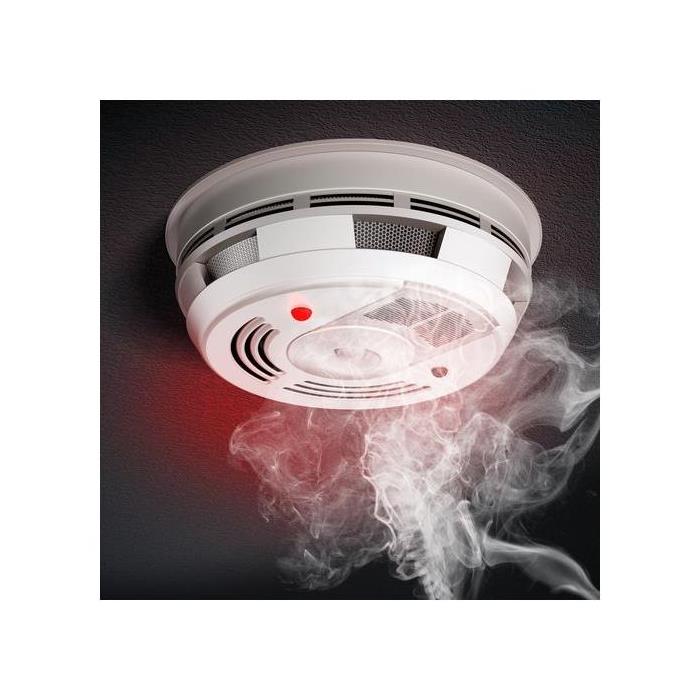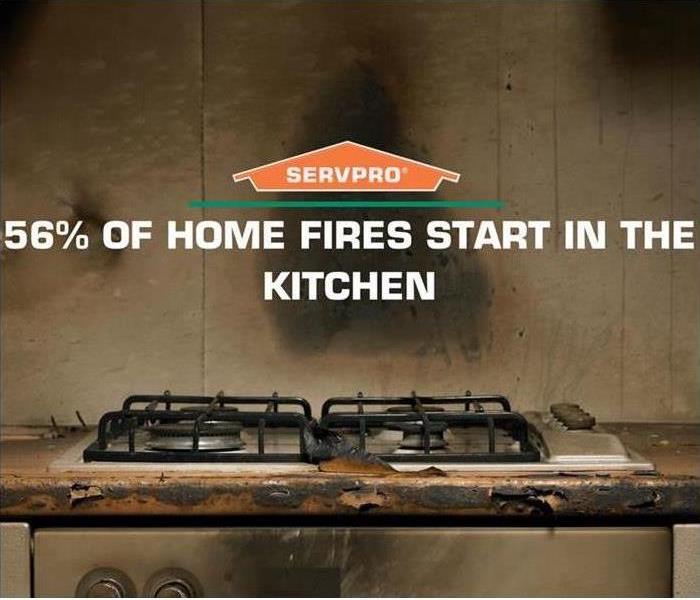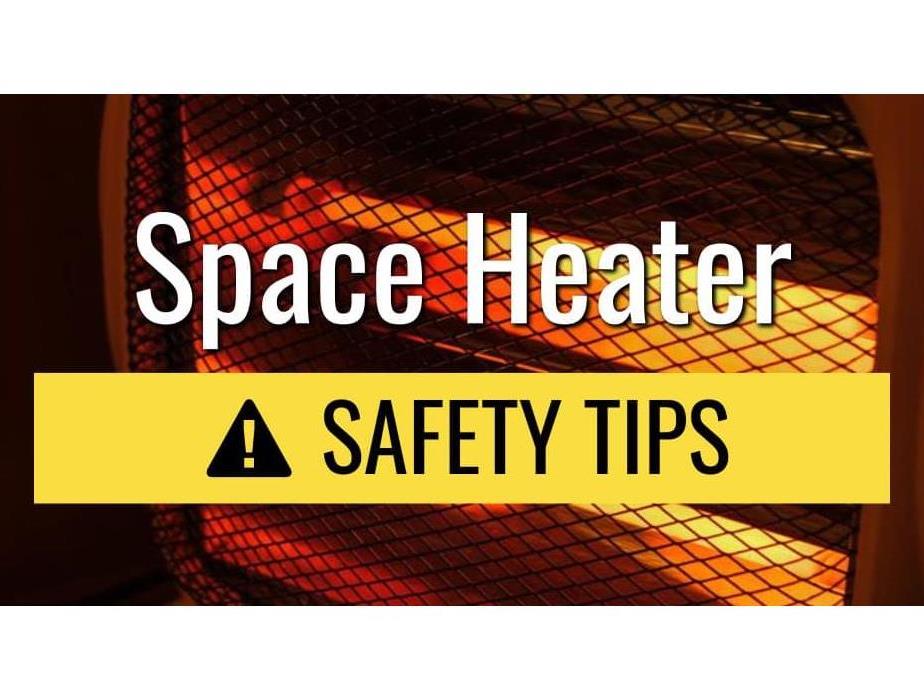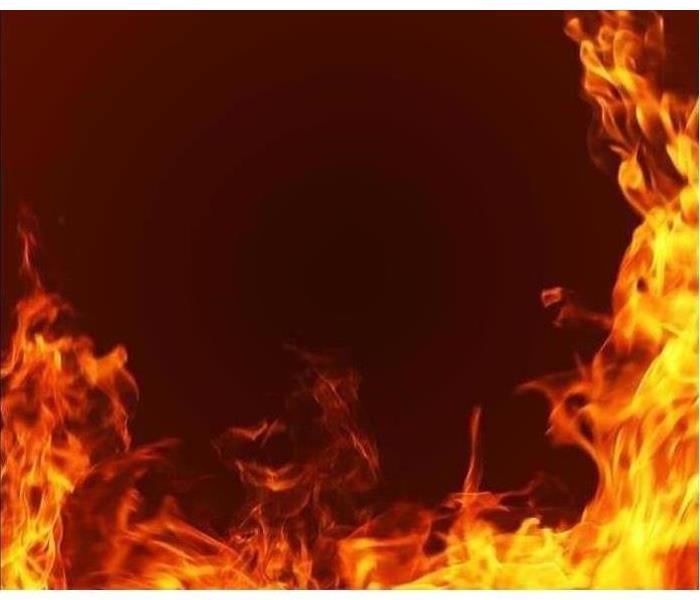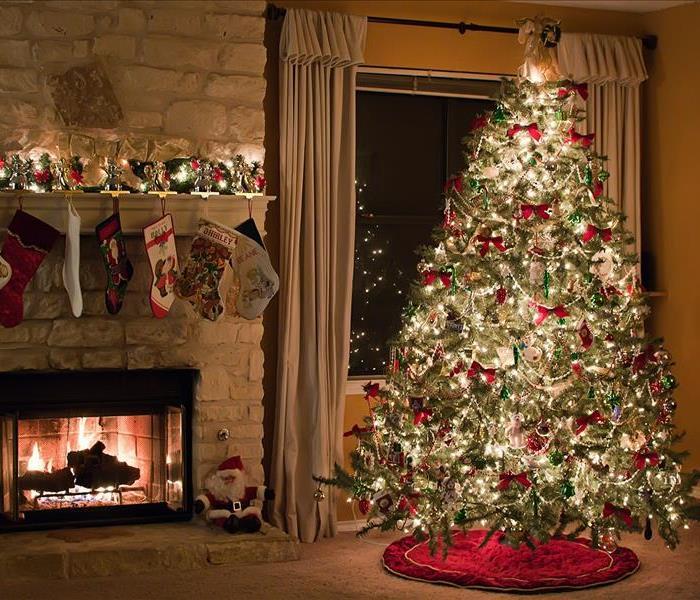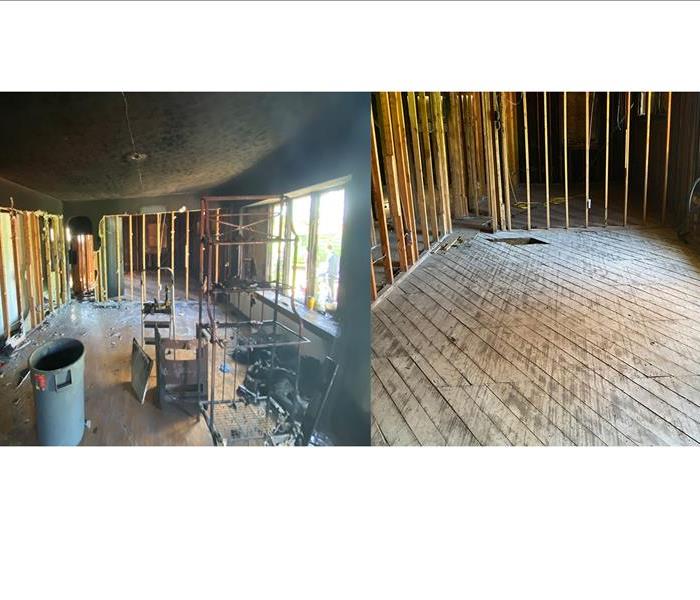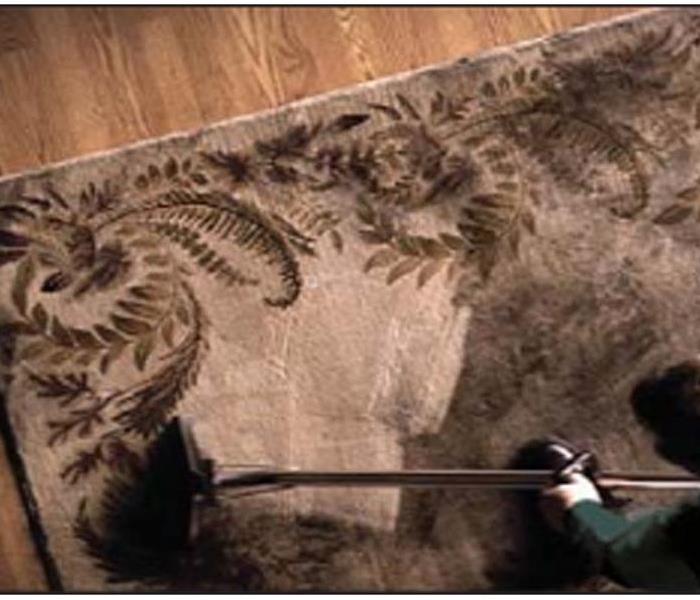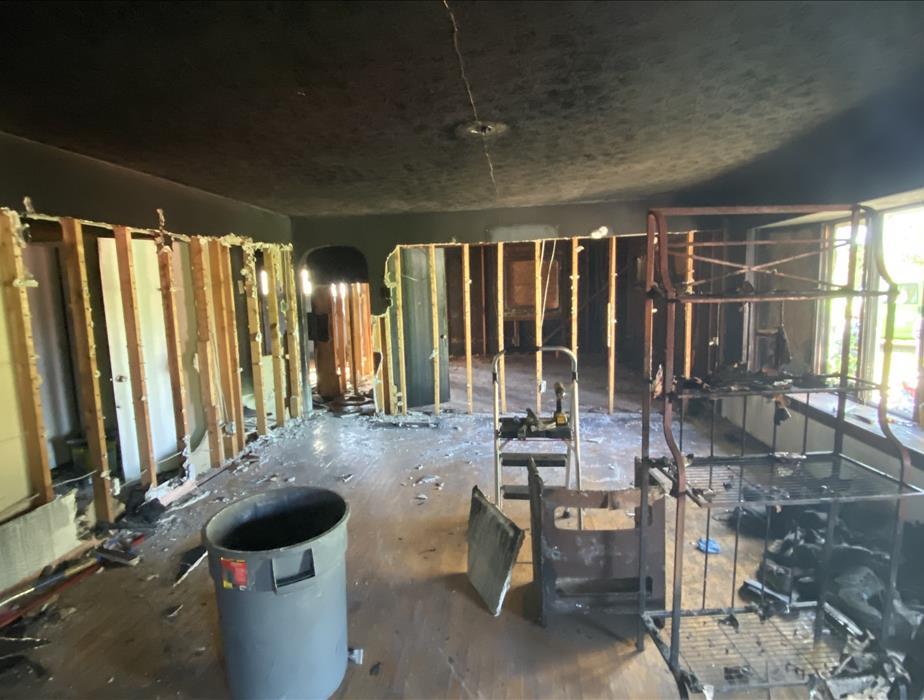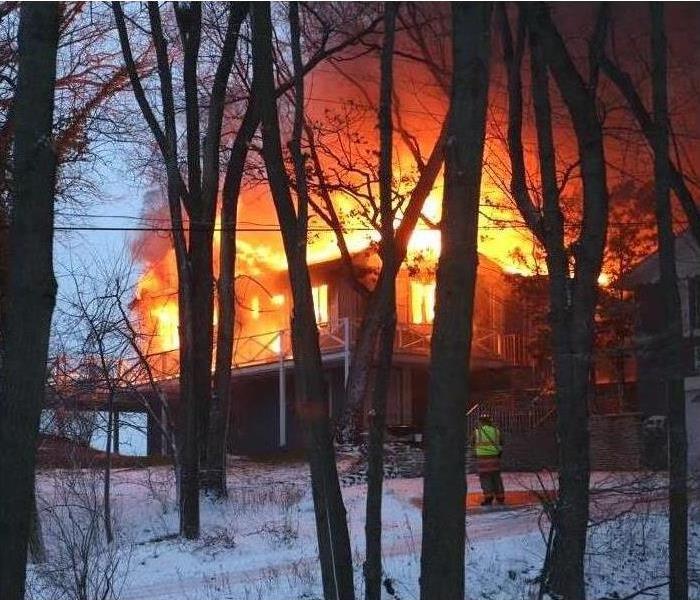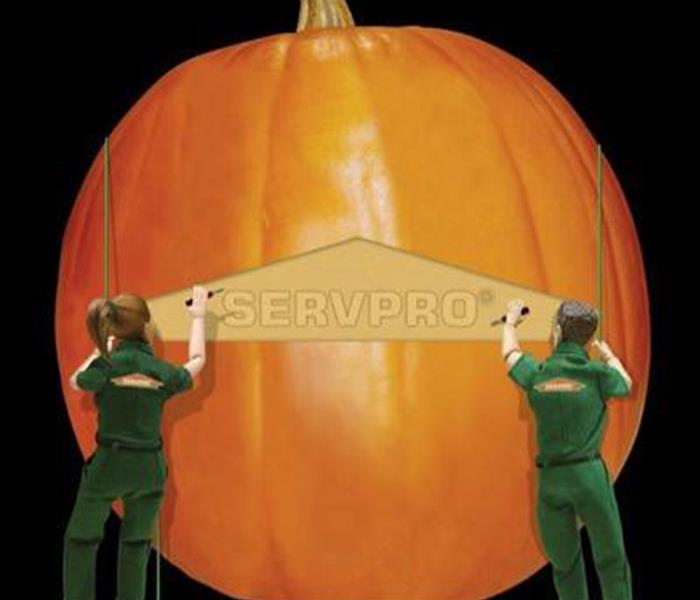Recent Fire Damage Posts
No job too big or too small
1/24/2024 (Permalink)
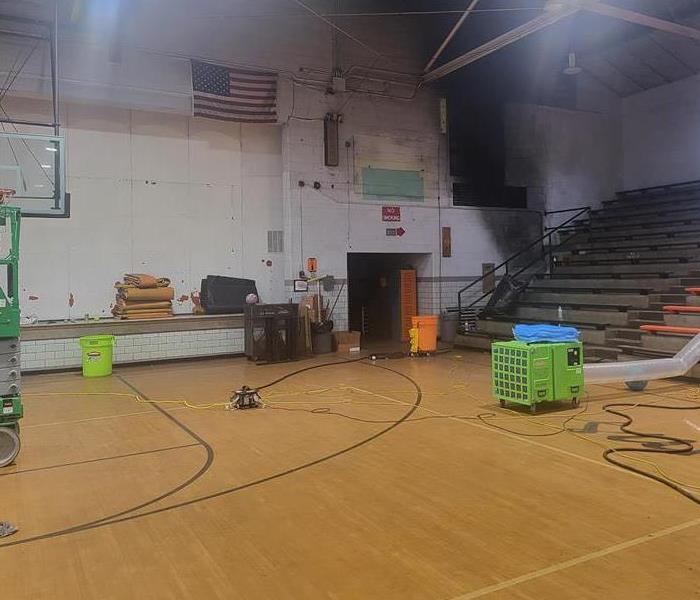 Ready to start remediation on a gym fire with heavy smoke damage.
Ready to start remediation on a gym fire with heavy smoke damage.
The after effects of a fire can be devastating whether it's in a residence or a commercial building or a school. SERVPRO of Boyd, Carter, Greenup & Lewis Counties has tackled jobs both big and small and the results are always the same, as good or better than before the fire. We received a call for a fire at a local school gym on the Friday before Christmas, we had a crew working through the weekend and it was all hands on deck the day after Christmas. It's been a long process but with the right equipment to get the job done they'll be back up and running soon!
STAY SAFE DURING THE HOLIDAY SEASON
10/18/2023 (Permalink)
With the Holiday Season rapidly approaching now is the time to make sure your household is ready and all your family members are aware of a few important safety tips.
1) Keep decorations at least 3 feet away from heat sources, especially those with open flames like candles and fireplaces.
2) Do not run extension cords under rugs or furniture.
3) Be sure to water live Christmas trees to keep them fresh and safe.
4) Always turn off decorations when not at home or when you're asleep.
5) If you're using extension cords consider adding more electrical outlets to your home.
6) Only use electronics in dry areas.
7) Make sure your home has working smoke detectors.
8) Switch off space heaters when you leave the room.
9) Inspect your decorations and discard any that are worn out or damaged.
10) Keep batteries stored safely in their packages and out of reach of small children and pets.
Please follow these simple rules and have a joyful holiday season.
Smoke and Soot Cleanup
5/2/2022 (Permalink)
Smoke and soot is very invasive and can penetrate various cavities within your home, causing hidden damage and odor. Our smoke damage expertise and experience allows us to inspect and accurately assess the extent of the damage to develop a comprehensive plan of action.
Smoke and soot facts:
- Hot smoke migrates to cooler areas and upper levels of a structure.
- Smoke flows around plumbing systems, seeping through the holes used by pipes to go from floor to floor.
- The type of smoke may greatly affect the restoration process.
Different Types of Smoke
There are two different types of smoke–wet and dry. As a result, there are different types of soot residue after a fire. Before restoration begins, SERVPRO will test the soot to determine which type of smoke damage occurred. The cleaning procedures will then be based on the information identified during pretesting. Here is some additional information:
Wet Smoke – Plastic and Rubber
- Low heat, smoldering, pungent odor, sticky, smeary. Smoke webs are more difficult to clean.
Dry Smoke – Paper and Wood
- Fast burning, high temperatures, heat rises therefore smoke rises.
Protein Fire Residue – Produced by evaporation of material rather than from a fire
- Virtually invisible, discolors paints and varnishes, extreme pungent odor.
Our Fire Damage Restoration Services
Since each smoke and fire damage situation is a little different, each one requires a unique solution tailored for the specific conditions. We have the equipment, expertise, and experience to restore your fire and smoke damage. We will also treat your family with empathy and respect and your property with care.
Have Questions about Fire, Smoke, or Soot Damage?
Call US Today 606-836-8000
Grilling Safety Tips For Warm Weather
4/18/2022 (Permalink)
July is just around the corner and happens to be the peak month for grilling fires, followed by May, June & August. Three out of five households own a gas grill, which translates to an increased risk of home fires. Nearly 9,000 home fires are started by grilling accidents each year.
The leading factor (19%) contributing to grill-related accidents is failure to clean the grill. The second leading factor (17%) is having a flammable item too close to the grill. So be sure to clean your grill properly before use and make sure that all flammable items are out of the way.
Placement of your grill is important, grills should be placed well away from home/deck railings and out from under eaves and branches. Also check for leaks or breaks in your gas lines before each use.
The National Fire Protection Association (NFPA) offers several additional grilling safety tips at http://www.nfpa.org/public-education/by-topic/outdoors-and-seasonal/grilling.
Please take the proper steps to avoid any grilling accidents this summer.
Smoke Alarms Save Lives
3/1/2022 (Permalink)
Smoke alarms play a vital role in saving lives, and when properly installed, can reduce the risk of fire injury in half.
The National Fire Protection Association recommends smoke alarms be install in every bedroom, outside all sleeping quarters and on every level of the house. Business owners should consult the local Fire Marshall to ensure specific building fire codes and smoke detectors requirements are met.
Smoke alarms work best when paired with a fire escape plan. A plan allows your family, employees or client to escape quickly and safely in an emergency situation.
Review the following tips regarding smoke detector installation and maintenance.
- Install smoke alarms on every level of the home including the basement.
- Smoke alarms should be installed away from the kitchen to prevent false alarms. Generally, they should be at least 10 feet from a cooking appliance.
- Test smoke alarms at least once a month using a test button.
- Replace batteries in all smoke alarms at least once a year. If an alarm "chirps" the battery is low and should be replaced right away.
- Replace all smoke alarms when they are 10 years old
Electrical Fire Hazards
2/14/2022 (Permalink)
Electrical fire hazards and how to prevent
Boyd, Carter, Greenup, and Lewis Counties
Electrical fires are known to be widespread throughout the U.S., causing injury, claiming lives, and resulting in large losses of property. This makes it incredibly important to know how to use your electrical appliances safely to deter a fire from occurring in the future. Learn more to understand the causes of electrical fires and what steps you can take to be safe around your electrical components in the future.
Causes of Electrical Fires
Most electrical fires result from problems with faulty electrical outlets and old wiring. Problems with extension/appliance cords and plugs also cause many home electrical fires. According to the National Fire Protection Association (NFPA):
- Lamps, light fixtures, and light bulbs (28%), and fixed wiring (22%) account for the largest share of fires among major types of electrical distribution equipment.
- Cords and plugs (39%) account for the largest share of civilian deaths.
- Lamps, light fixtures, and light bulbs (30%) account for the largest share of civilian injuries.
Safety Precautions to Take Around Electrical Components
To help prevent an electrical fire in your home, routinely check electrical appliances and wiring. Following these key tips will also ensure that you keep your home safe from an electrical fire:
- Replace or repair loose or frayed cords on all electrical devices.
- Avoid running extension cords across doorways or under carpets.
- Consider having additional circuits or outlets added by a qualified electrician so you do not have
- to use extension cords.
Restoring Homes Following Electrical Fire Damage
When your home gets struck by an electrical fire, not any restoration service will do to handle the cleanup after the fallout. It takes a specialized team of trained professionals like the ones here at SERVPRO of Boyd, Carter, Greenup, and Lewis Counties to treat you with respect and empathy while always treating your home and belongings with great care. If you need our fire damage restoration solutions to help your property get back to normal following an electrical fire, call us today at (606) 836-8000 for a consultation!
Get Those Contents Clean!
2/6/2022 (Permalink)
All of the restorable contents in affected areas will be professionally cleaned and deodorized. To do this properly, the contents will be transferred to our cleaning facility. This includes area rugs, furniture, draperies, and upholstery. SERVPRO of Boyd, Carter, Greenup & Lewis Counties Professionals will begin by carefully inspecting and testing all fabrics in the structure to determine which cleaning methods are most appropriate. Professionals can provide wet or dry cleaning services. Additionally, all the other restorable contents will be cleaned and deodorized to preloss condition. This includes electronics, art, wood furniture, kitchen items, clothing, bedding, and much more. Finally, we will provide an inventory list of all “to be claimed” items if requested.
Let SERVPRO of Boyd, Carter, Greenup & Lewis Counties help you make it "Like it never even happened."
Keep Fall Fire-Free
11/22/2021 (Permalink)
The fall season brings cooler temperatures, beautiful colors, and an abundance of outdoor activities. Plan ahead this season to help ensure it is safe and fire-free.
- Fall decoration, like dried flowers and cornstalks, are highly flammable. Keep these and other decorations away from open flames and heat sources, including light bulbs and heaters.
- Keep emergency exits clear of decorations so nothing blocks escape routes.
- Teach children to stay away from open flames. Be sure they know how to stop, drop, and roll if their clothing catches fire.
- Remember safety first when choosing a Halloween costume. Consider avoiding billowing fabric. If you are making your costume, choose material that won't easily ignite if it comes into contact with heat or a flame.
- It is safest to use a flashlight or battery-operated candle in a jack-o-lantern. Use extreme caution if using a real candle. Place lit pumpkins away from anything that can burn, and out of the way of doorsteps, walkways, and yards.
Facts and information provided by National Fire Protection Association, nfpa.org
Electrical Fire Hazards
2/15/2021 (Permalink)
Electrical fire hazards and how to prevent
Boyd, Carter, Greenup, and Lewis Counties
Electrical fires are known to be widespread throughout the U.S., causing injury, claiming lives, and resulting in large losses of property. This makes it incredibly important to know how to use your electrical appliances safely to deter a fire from occurring in the future. Learn more to understand the causes of electrical fires and what steps you can take to be safe around your electrical components in the future.
Causes of Electrical Fires
Most electrical fires result from problems with faulty electrical outlets and old wiring. Problems with extension/appliance cords and plugs also cause many home electrical fires. According to the National Fire Protection Association (NFPA):
- Lamps, light fixtures, and light bulbs (28%), and fixed wiring (22%) account for the largest share of fires among major types of electrical distribution equipment.
- Cords and plugs (39%) account for the largest share of civilian deaths.
- Lamps, light fixtures, and light bulbs (30%) account for the largest share of civilian injuries.
Safety Precautions to Take Around Electrical Components
To help prevent an electrical fire in your home, routinely check electrical appliances and wiring. Following these key tips will also ensure that you keep your home safe from an electrical fire:
- Replace or repair loose or frayed cords on all electrical devices.
- Avoid running extension cords across doorways or under carpets.
- Consider having additional circuits or outlets added by a qualified electrician so you do not have
- to use extension cords.
Restoring Homes Following Electrical Fire Damage
When your home gets struck by an electrical fire, not any restoration service will do to handle the cleanup after the fallout. It takes a specialized team of trained professionals like the ones here at SERVPRO of Boyd, Carter, Greenup, and Lewis Counties to treat you with respect and empathy while always treating your home and belongings with great care. If you need our fire damage restoration solutions to help your property get back to normal following an electrical fire, call us today at (606) 836-8000 for a consultation!
Common Causes of Household Fires
1/16/2021 (Permalink)
Here are top 5 most common causes of house fires as identified by the National Fire Protection Association.
Candles
From 2007-2011, the NFPA says there were an average of 10,630 fires in the U.S. that were started by candles, causing 115 deaths, 903 injuries and approximately $418 million in property damage. That is an average of 29 candle fires per day.
Safety tips:
- Never leave a candle burning near flammable items.
- Never leave a candle burning in a child’s room or an unoccupied room.
- Make sure candles fit securing into candle holders so they won’t tip over.
- Blow out any candles before leaving a room or going to sleep
Smoking
While the number of fires caused by smoking is trending downward, the NFPA found that there was still an average of 17,600 related fires per year resulting in 490 deaths and more than $516 million in property damage.
Safety tips:
- If you smoke, consider smoking outside.
- Use wide, sturdy ashtrays to catch butts and ashes.
- Look for cigarette butts under furniture and between seat cushions to make sure no lit butts have fallen someplace where they can’t be seen.
- Don’t smoke in bed, when you’re tired or around medical oxygen.
Electrical & Lighting
According to the NFPA, in 2011 approximately 47,700 home structure fires were caused by some sort of electrical failure or malfunction. These resulted in 418 deaths, 1,570 injuries and $1.4 billion in property damage.
Safety tips:
- Don’t overload outlets or electrical cords.
- Make sure you have the right cord for the job – inside cords for inside, heavy duty/outside cords for outdoor use.
- Don’t leave Christmas lights, Christmas trees, or halogen lights on overnight or when not at home.
- Consider having an electrician perform an annual checkup of your home’s wiring.
Dryers & Washing Machines
Clothes dryer fires happen more often than one might think, accounting for 16,800 home structure fires in 2010 and doing more than $236 million in property damage.
Safety tips:
- Clean the lint screen frequently and don’t run the dryer without it.
- For gas and propane dryers, make sure there aren’t any leaks in the lines.
- Vent the dryer to the outside of the house and ensure nothing blocks the vent pipe.
- Clean the vent pipe and the area where the screen is housed.
- Keep the area around the dryer free of combustible materials.
Lightning
From 2007-2011, NFPA says there were an average of 22,600 fires per year caused by lightning strikes.
Safety tips:
- Stay away from doors and windows during an electrical storm.
- Do not use corded phones, computers, TVs or other electrical equipment during storms.
- Unplug major electronics – TVs, stereo equipment, computers and microwaves to minimize damage if there is a lightning strike close by.
- Avoid plumbing such as sinks, baths and faucets during a thunderstorm.
You experience a fire in your home, don't hesitate to call SERVPRO of Boyd, Carter, Greenup and Lewis Counties at (606) 836-8000
Extinguish Odors With Deodorization
1/14/2021 (Permalink)
Even a small fire can cause odors for years to come if the affected areas are not properly cleaned and deodorized. Fire, smoke, and soot damage in your home or business can create unpleasant and potentially permanent problems. As various materials burn, the smoke produced travels throughout the structure, leaving odorous residues and deposits on surfaces and in hard-to-reach places. Unless fast, professional action is taken, these residues and deposits can cause permanent damage to contents and may result in resurfacing odors.
With technicians certified by the Institute of Inspection, Cleaning, and Restoration (IIRC), SERVPRO of Boyd, Carter, Greenup & Lewis Counties provides specialized services that can rid your home or business of offensive odors left by fire or smoke damage. We do not cover up lingering odors with a fragrance; we seek out and remove the sources of the odor. If you or a customer suffer fire damage or some other accident and require deodorization services, contact SERVPRO of Boyd, Carter, Greenup & Lewis Counties at (606) 836-8000. Whether its fire, water, or mold damage, or just a stubborn odor that refuses to go away, we'll help make it "Like it never even happened."
Other Odors that may require DEODORIZATION:
- Cigarette Smoke
- Pet Odors
- Decomposition
- Mold
Space Heaters Need Their Space
1/14/2021 (Permalink)
SERVPRO of Boyd, Carter, Greenup & Lewis Counties reminds you that half of all home heating fires happen during the months of December, January, and February. The National Fire Protection Association Agency offer the following safety tips:
- Place the heater on a hard, level, and nonflammable surface. They are intended to sit on the floor and not a table.
- Establish a 3-foot kid and pet-free zone around the heater, and never put a space heater in a child's room.
- Keep the space heater at least 3 feet away from such combustible materials as furniture, bedding, and curtains.
- Do not use a heater in a workshop or garage near paint, gas cans, or matches.
- Turn it off when you leave the room or go to bed.
- Unplug the heater when not in use by pulling the plug straight from the outlet. Check the cord for damage periodically, and do not use it if it’s frayed or worn.
- Do not plug another electrical device or an extension cord into the same outlet as a heater, which can cause overheating.
- Install working smoke alarms on every level of your home and test them monthly.
SERVPRO of Boyd, Carter, Greenup and Lewis Counties is always available 24/7/365 to service your needs!
Smoke and Soot Cleanup
1/14/2021 (Permalink)
Smoke and soot are very invasive and can penetrate various cavities within your home, causing hidden damage and odor. Our smoke damage expertise and experience allow us to inspect and accurately assess the extent of the damage to develop a comprehensive plan of action.
Smoke and soot facts:
- Hot smoke migrates to cooler areas and upper levels of a structure.
- Smoke flows around plumbing systems, seeping through the holes used by pipes to go from floor to floor.
- The type of smoke may greatly affect the restoration process.
Different Types of Smoke
There are two different types of smoke–wet and dry. As a result, there are different types of soot residue after a fire. Before restoration begins, SERVPRO of will test the soot to determine which type of smoke damage occurred. The cleaning procedures will then be based on the information identified during pretesting. Here is some additional information:
Wet Smoke – Plastic and Rubber
- Low heat, smoldering, pungent odor, sticky, smeary. Smoke webs are more difficult to clean.
Dry Smoke – Paper and Wood
- Fast burning, high temperatures, heat rises therefore smoke rises.
Protein Fire Residue – Produced by evaporation of material rather than from a fire
- Virtually invisible, discolors paints and varnishes, extreme pungent odor.
Our Fire Damage Restoration Services
Since each smoke and fire damage situation is a little different, each one requires a unique solution tailored for the specific conditions. We have the equipment, expertise, and experience to restore your fire and smoke damage. We will also treat your family with empathy and respect and your property with care.
Have Questions about Fire, Smoke, or Soot Damage?
Call SERVPRO of Boyd, Carter, Greenup and Lewis Counties today at (606) 836-8000
Tips For Preventing Fires
11/3/2020 (Permalink)
As the temperature starts to drop we begin see an increase in fire damage. This blog will focus on ways to help prevent fires at your home or business. According to a 2018 study there were over 1.3 million properties that suffered a fire damage. This resulted in over 15,000 injuries and over 25 million dollars in repairs. By practicing these tips you can help prevent having a fire at your house.
-Check Smoke Detectors Regularly
When a fire initially starts a properly working smoke detector can not only save you money, but it could also save your life. It is recommended to test them monthly and frequently exchange the batteries. It only takes a few minutes to test them and its recommended to completely replace the detectors once every ten years. If your house has more then one floor its best to have detectors on each level and especially one close to each sleeping area.
-Watch Your Appliances
Stoves, washing machines, and microwaves all make our lives easier. However, when not used properly they can easily start a fire. Its recommended to clean these appliances regularly and not to use them when nobody is present.
-Be Extra Safe in The Kitchen
Recent studies have show that over half of house fires start in the kitchen. It’s important make sure you keep a fire extinguisher in close reach of the kitchen. Grease fires are most common in this area. It’s important to know that you must treat a grease fire differently than a regular fire. Never use water to put out a grease fire. Instead try to cover the fire with a heavy metal lid or dump baking soda directly on it.
-Don’t Smoke Inside
We don’t recommend smoking period. However, if you do please step outside and dispose your cigarette butts in a safe place.
-Have A Plan
Even if you follow all these tips there is still a chance your home could experience a fire. It’s smart to have an emergency plan in place. If you don’t already one the best time to make one is now. Choose a safe meeting place outside your house. Establish escape routes from every room of your house. Finally make sure everyone in your home knows where the fire extinguishers are and how to use them properly.
SERVPRO of Boyd, Carter, Greenup & Lewis Counties (606) 836-8000.
Fire Damage- The Breakdown of Damage
11/2/2020 (Permalink)
Fire Damage-The Breakdown Of Damage
There are roughly 300,000 to 400,000 residential home fires per year in the United States. These fires range from small to large and originate inside of the home. Fires are a devastating occurrence for homeowners and are extremely hard to overcome, as they take months to clean and repair. SERVPRO of Boyd, Carter, Greenup & Lewis County specializes in fire damage restoration and is here to help if you find yourself in need.
Damage to your structure and contents happen rapidly after the fire occurs. Every second counts after the fire is extinguished and our professionals know that damages increase and cost escalates the longer neutralization, corrosion control and cleaning is delayed. When restoration is prolonged, effects brought on by smoke exposure are extended. Below is a breakdown of the damage and effects from fire and smoke on a home.
Within Minutes:
Acid soot residues cause plastics to yellow; small appliances located close to the source of combustion discolor; highly porous materials (marble, alabaster) discolor permanently.
Within Hours:
Acid residues stain grout in bathrooms; fiberglass bath fixtures may yellow; uncoated metals tarnish, countertops may yellow; finishes on appliances, particularly refrigerators, may yellow; furniture finishes may discolor.
Within Days:
In time, acid residues cause painted walls to yellow permanently; metal corrodes, pits and rusts; wood furniture requires refinishing; vinyl flooring requires refinishing or replacement; clothing becomes soot stained; upholstery stains permanently.
Within Weeks:
Restoration costs escalate tremendously. Synthetic carpet fibers may yellow or discolor permanently; silver plate is corroded permanently; glass, crystal, china may require replacement due to severe etching and pitting caused by prolonged exposure to acid soot residues.
Understanding the effects of fire and how quickly items need to be evaluated and attended to can minimize the need for costly repair. Our fire and smoke restoration experts can help you return to your home and bring most of your items to “preloss” condition. If you find yourself in need of restoration after a fire, call our office at (606)836-8000.
Picking and Maintaining The Perfect Christmas Tree
12/10/2019 (Permalink)
When Picking Your Tree:
- Check the trunk for stickiness
- Check limbs for flexibility
- Tap trunk of tree on the ground, if a lot of needles fall off, it's not a fresh tree
Maintaining Your Tree:
- Cut 2" off of the trunk to get to the "Fresh Meat" so it can soak up water (DO NOT SKIP THIS STEP)
- Make sure the water in your tree stand stays above the bottom of the trunk
- Once the trunk is soaking in water, there should be no reason to refill the stand
A real Christmas Tree can fill your home with the smell of Christmas however, properly hydrating your tree is one of the most important parts of preventing Christmas tree fires! Please keep this in mind when searching for that perfect tree!
Top 5 Causes Of House Fires
12/10/2019 (Permalink)
Here are the top 5 most common causes of house fires as identified by the National Fire Protection Association.
- Candles
From 2007-2011, the NFPA says there was an average of 10,630 fires in the U.S. that were started by candles, causing 115 deaths, 903 injuries and approximately $418 million in property damage. That is an average of 29 candle fires per day.
Safety tips:
- Never leave a candle burning near flammable items.
- Never leave a candle burning in a child’s room or an unoccupied room.
- Make sure candles fit securing into candle holders so they won’t tip over.
- Blow out any candles before leaving a room or going to sleep
- Smoking
While the number of fires caused by smoking is trending downward, the NFPA found that there was still an average of 17,600 related fires per year resulting in 490 deaths and more than $516 million in property damage.
Safety tips:
- If you smoke, consider smoking outside.
- Use wide, sturdy ashtrays to catch butts and ashes.
- Look for cigarette butts under furniture and between seat cushions to make sure no lit butts have fallen someplace where they can’t be seen.
- Don’t smoke in bed, when you’re tired or around medical oxygen.
- Electrical & Lighting
According to the NFPA, in 2011 approximately 47,700 home structure fires were caused by some sort of electrical failure or malfunction. These resulted in 418 deaths, 1,570 injuries and $1.4 billion in property damage.
Safety tips:
- Don’t overload outlets or electrical cords.
- Make sure you have the right cord for the job – inside cords for inside, heavy-duty/outside cords for outdoor use.
- Don’t leave Christmas lights, Christmas trees, or halogen lights on overnight or when not at home.
- Consider having an electrician perform an annual checkup of your home’s wiring.
- Dryers & Washing Machines
Clothes dryer fires happen more often than one might think, accounting for 16,800 home structure fires in 2010 and doing more than $236 million in property damage.
Safety tips:
- Clean the lint screen frequently and don’t run the dryer without it.
- For gas and propane dryers, make sure there aren’t any leaks in the lines.
- Vent the dryer to the outside of the house and ensure nothing blocks the vent pipe.
- Clean the vent pipe and the area where the screen is housed.
- Keep the area around the dryer free of combustible materials.
- Lightning
From 2007-2011, NFPA says there was an average of 22,600 fires per year caused by lightning strikes.
Safety tips:
- Stay away from doors and windows during an electrical storm.
- Do not use corded phones, computers, TVs or other electrical equipment during storms.
- Unplug major electronics – TVs, stereo equipment, computers, and microwaves to minimize damage if there is a lightning strike close by.
- Avoid plumbing such as sinks, baths, and faucets during a thunderstorm.
You experience a fire in your home, don't hesitate to call SERVPRO of Boyd, Carter, Greenup & Lewis Counties at (606) 836-8000.
Do You Know Who To Call After The Fire Department Leaves?
12/4/2019 (Permalink)
After a smoke or fire damage, ceilings, walls, woodwork, carpeting, and floors will often need a thorough cleaning. SERVPRO of Boyd, Carter, Greenup & Lewis Counties are the Professionals that will pretest to determine the extent of damage, and then use the specific equipment and cleaning products required to clean and protect the different types of surfaces found in your structure. Depending on the amount of soot, we may even be able to reduce the cost of recovery by cleaning lighter soot deposits found on some surfaces, eliminating the expense incurred with repainting or refinishing. In other cases, SERVPRO will clean to “prepare for painting”. This process deodorizes and ensures the new paint will adhere properly to the surface.
If you've suffered from a fire loss give the professionals at SERVPRO of Boyd, Carter, Greenup & Lewis Counties a call (606) 836-8000.
Cleaning Contents Affected By Fire
12/4/2019 (Permalink)
All of the restorable contents in affected areas will be professionally cleaned and deodorized. To do this properly, the contents will be transferred to our cleaning facility. This includes area rugs, furniture, draperies, and upholstery. SERVPRO of Boyd, Carter, Greenup & Lewis Counties Professionals will begin by carefully inspecting and testing all fabrics in the structure to determine which cleaning methods are most appropriate. Professionals can provide wet or dry cleaning services. Additionally, all the other restorable contents will be cleaned and deodorized to preloss condition. This includes electronics, art, wood furniture, kitchen items, clothing, bedding, and much more. Finally, we will provide an inventory list of all “to be claimed” items if requested.
Let SERVPRO of Boyd, Carter, Greenup & Lewis Counties help you make it "Like it never even happened."
When Your House Sets Ablaze
11/4/2019 (Permalink)
A fire can happen at any time. Being prepared will help reduce its devastating effects. The first few minutes following a fire are the most significant. If you do not act quickly, there can be consequences; the correct response to a fire can keep effects minimal.
When a fire occurs, notify the fire department, the police department, and the insurance company. Next, call a disaster restoration company, such as SERVPRO of Boyd, Carter, Greenup & Lewis Counties to help prevent further damage.
By evaluating the materials and surfaces affected, a disaster restoration company will provide an understanding of the fire's chemistry and allow for a targeted, informed restoration effort. Even though each fire's chemistry differs, one of the most important things disaster restoration companies do immediately is wipe down the affected areas to avoid further damage caused by humidity and acidic residues. They will use air scrubbers, which are highly filtered air machines, so soot particles will not recontaminate air and will limit the redistribution of contaminated particles while restoration work continues. They will pull all filters from the HVAC system, clean and recondition the system, and then install new filters.
A fire is usually a complex fire, the result of incomplete combustion and fueled by synthetic materials, including those found in carpets, furniture, plumbing, and other equipment. Complex fires cause the most damage and leave the most waste, but disaster restoration professionals can professionally handle the cleanup and restoration.
50% of Fires Start In The Kitchen
11/4/2019 (Permalink)
SERVPRO of Boyd, Carter, Greenup & Lewis Counties knows that cooking equipment is the leading cause of fire damage and fire injuries in the home.
SERVPRO wants you to be safe, so to help prevent fire damage, we have these suggestions for preventing kitchen fires. They make more sense than not cooking at home.
SERVPRO of Boyd, Carter, Greenup & Lewis Counties offer these tips for Fire Prevention in the kitchen:
- Keep anything that can catch fire at least 3 feet away from the stovetop
- Many kitchen items can catch fire, including dishtowels, oven mitts, recipes, wooden tools, and loose clothing
- Never operate the stove or oven when you are tired or have been drinking alcohol
- Keep children at least 3 feet away from the stove or oven
- If you are frying, broiling, grilling, or boiling food, stay in the kitchen. If you leave, even for a short time, turn off the heat
- If you are baking, roasting, or simmering food, stay in the house. If you leave, even for a short time, turn off the heat
Remember that fire is fast. If you cannot contain a fire immediately, leave and bring everyone with you. Call 9-1-1 from outside the home.
SERVPRO of Boyd, Carter, Greenup & Lewis Counties reminds you that fire prevention is the best strategy against fire damage. Give us a call today at (606) 836-8000
Understanding The Process Of Cleaning Up Smoke Damage
8/15/2019 (Permalink)
Smoke damage can often be one of the most widespread effects to contend within your home after a fire disaster. While there are many other concerns, such as structural weaknesses that often take precedent for restorations and mitigation, restoring damage to your property should be a focus of whatever professional outfit you choose. Our team can arrive quickly to help lessen the damage and prolonged impact of a fire emergency, and work to eliminate the presence of smoke damage.
Much of the cleanup and restoration for these results in your home focus on odor removal. Indoor air quality is also a primary focus for our SERVPRO® professionals dispatched to your home once the first responders have left. We work quickly to establish our purification equipment such as air scrubbers and hydroxyl generators to run the available air through HEPA filters overtime to begin pulling smoke particles and soot from the environment and reducing hazards or risks of exposure without respirators.
Smoke damage often depends on the type of smoke that affected your home throughout the fire. Dry smoke results from high heat, but is also a residue that is much easier for our SERVPRO technicians to clean with dry and wet sponges on the coated surfaces. Wet smoke leaves a thick residue on surfaces and contents, which often requires specialized equipment to clean and deodorize fully. The heat generated by a house fire plays a key role in the actual penetration of soot particles into porous materials like drywall and fabrics.
Improving the scent of your home after a fire is also a concern for our team, but these steps often follow reconstruction and other restoration efforts. Waiting for deodorization allows our technicians to leave your home completely cleaned and odor-free. Our thermal foggers can often do the greatest amount of deodorization, as these machines are suitable to use in open areas, fabrics, soft materials, and work to remove odors from surfaces as well.
Smoke can provide many damaging effects to your home after a fire emergency. Our SERVPRO of Boyd, Carter, Greenup & Lewis Counties' response team has the expertise and tools to help. Give us a call today at (606) 836-8000
Our Guide To Successfully Restoring Your Fire Damaged Home
12/10/2018 (Permalink)
Fire Damage Crew Discusses The Restoration Process
If a fire ever takes place on your property in Dover, it is a good idea to call in a professional restoration company like SERVPRO. In many cases, the fire damage can get worse if it is not attended to quickly by experienced technicians. Soot residues can permanently stain surfaces and be harder to remove if not treated promptly. The longer burnt smells exist in a building, the more difficult they will be to remove. In some fire damage situations, water can be an issue if it was used to extinguish the blaze.
Since we know that time is vital, our SERVPRO team responds to every emergency call we receive as quickly as possible. Even though every fire damage project is different, our team always follows the same procedure to make sure all bases are covered. The process always follows a set of steps that ensure we do the best job we can.
The first step of our restoration process starts with the first phone call. Once you call us and tell us you have a problem we take all of your contact information and figure out as much as we can about your situation over the phone. We then schedule a time to come to your home and proceed to the next step.
Next, we arrive at your home and get the remainder of the information we need from you. We find out from you everything that happened so that we get a good idea of where we need to inspect. Then, we go throughout your house and inspect for problems. We also test affected areas and try to figure out if affected materials are cleanable or not.
We then make an initial estimate for you and your insurance adjuster that gives a good idea of the work involved. We outline what we think needs to be replaced and what we think we can save. Next, we schedule all of the working procedures with you and begin the restoration procedures.
Can your bedroom door keep flames and smoke out?
12/3/2018 (Permalink)
Here is a good video on how safe your bedroom could be during a fire. These little tips could definitely help any person during a fire situation. Enjoy the video. These little tips could keep your family safe and alive. Hope this helps any husband, wife or parent. Here is the link for the story.
https://www.today.com/video/fire-safety-can-your-bedroom-door-keep-flames-and-smoke-out-1344392259981?v=raila&cid=public-rss_20181015
Officials are issuing an urgent alert when it comes to home fires – sleep with your bedroom door closed. Turns out, this simple decision dramatically increases your chance of survival if your house were to catch fire. TODAY national investigative correspondent Jeff Rossen reports and has an eye-opening demonstration.
Seasonal Heating Hazards
12/3/2018 (Permalink)
SERVPRO of Boyd, Carter, Greenup & Lewis Counties are experts at cleaning and restoring homes damaged by fire and smoke.
After smoke or fire damage, ceilings, walls, woodwork, carpeting and floors will often need a thorough cleaning. Your SERVPRO professional will pretest to determine the extent of damage, and then use the specific equipment and cleaning products required to clean and protect the different surfaces found in your home.
Seasonal heating hazards are important to consider to prevent home fires.
Space heaters should always be at least 3 feet away from combustible items.
Lighted Candles should never be left untended.
Fire places and chimneys should always be cleaned seasonally. Check to make sure the flue is open before lighting the fire.
If you experience a home fire of any size, call your insurance company and then call SERVPRO of Boyd, Carter, Greenup & Lewis Counties to inspect damage.
Renters Insurance
11/1/2018 (Permalink)
 Grease Fire
Grease Fire
The number of renters has grown dramatically in some of the most populous—and disaster-prone—U.S. cities, yet few renters actually purchase insurance, according to theInsurance Information Institute(I.I.I.)
Indeed, only 37 percent of renters have renters insurance whereas 95 percent of homeowners have a homeowners insurance policy, according to a 2014 I.I.I. poll conducted by ORC International.
“Renters insurance provides a very important financial safety net when there is a disaster,” points out Jeanne M. Salvatore, senior vice president and chief communications officer for the I.I.I. “And, renters insurance is relatively inexpensive—the average cost of a renter’s policy is only $187 per year, or less than four dollars per week.”
If you own expensive jewelry, collectibles, musical instruments or even high-end sports equipment, you may want to add a floater or endorsement to your renters policy. This would provide broader coverage for risks such as “mysterious disappearance.” So even if you lose the item, you would be covered.
As a renter, insurance is a must!
11/1/2018 (Permalink)
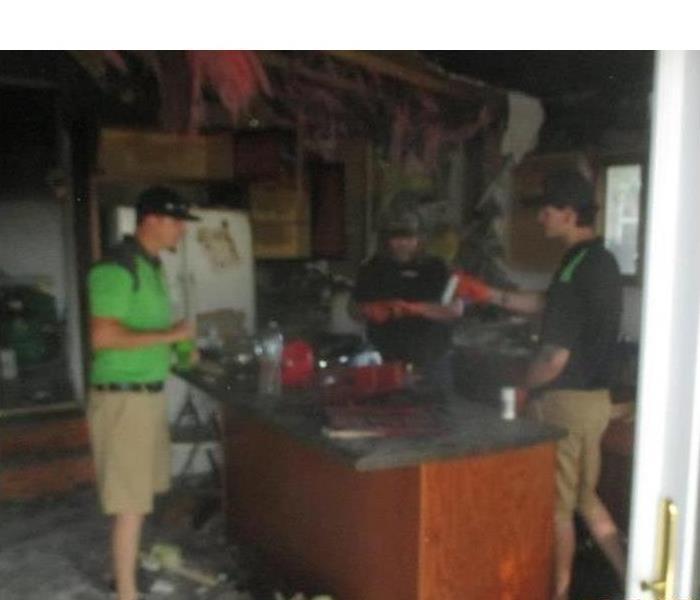 Severe Fire Damage
Severe Fire Damage
SERVPRO Employees scoping fire loss that did severe damaged to main level of the house. The tenant that lived hear had no renters insurance. All of their belongings (TV's, childrens toys, beds, clothing, furniture and food) were destroyed due to soot and high heat damage or burned by the fire. The cost to demo, clean and rebuild the structure to pre loss condition will be around $50,000.00
According to Insurance Information Institute
“Many renters are under the misconception that their landlord’s insurance policy will reimburse them if their personal property is damaged or destroyed, but that’s just not the case,” says Salvatore. “Fortunately, renters have a range of insurance options to choose from.”
Renters insurance provides financial protection against damage to or loss of personal possessions due to hurricanes, fire, lightning, theft, explosion and other disasters listed in the policy. There is even coverage for water damage caused by burst pipes or a neighbor who forgets to shut off the water in the tub. Coverage is available on either an actual cash value basis (depreciated value) or for its replacement cost (no deduction for depreciation). Renters insurance does NOT cover flooding and earthquake, but separate policies can be purchased for these events.
Fire Damage
10/30/2018 (Permalink)
 Charcoal Aftermath
Charcoal Aftermath
Fires can be life changing and life altering, especially during the busy holiday season. This home suffered a major fire that practically destroyed the entire house. We helped clean up what debris was left, moved any salvageable contents back to our warehouse for storage until the house is repaired. We were able to clean and restore many of the customers’ contents that she thought were never going to look the same. She was amazed with the work our entire staff put in. In this before picture you see the extreme devastation a fire can do. And after 2 weeks of demo and cleaning this is an after picture, what a difference. The job is far from over and the customer has a lot more work ahead but SERVPRO of Boyd, Carter, Greenup & Lewis Counties was there and we tackled the job!
Smoke and Soot Cleanup
8/17/2018 (Permalink)
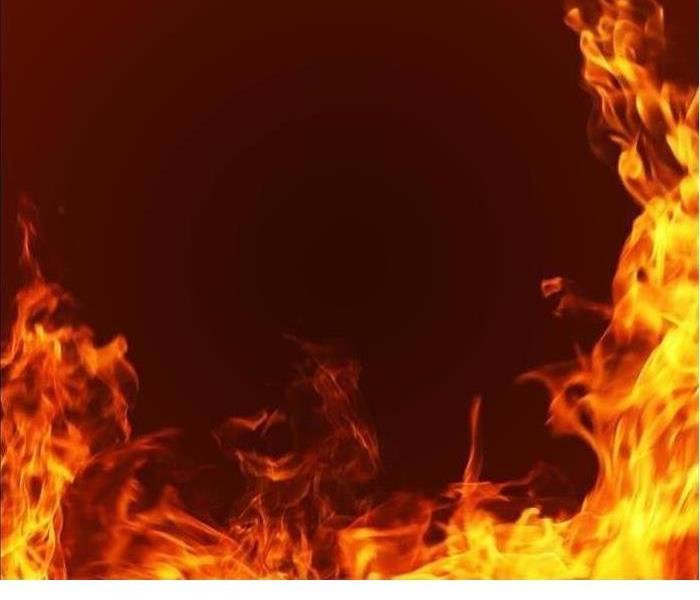 Smoke and Soot Damage Can Cause a Pervasive Odor in Your Washington DC Home.
Smoke and Soot Damage Can Cause a Pervasive Odor in Your Washington DC Home.
Smoke and soot is very invasive and can penetrate various cavities within your home, causing hidden damage and odor. Our smoke damage expertise and experience allows us to inspect and accurately assess the extent of the damage to develop a comprehensive plan of action.
Smoke and soot facts:
- Hot smoke migrates to cooler areas and upper levels of a structure.
- Smoke flows around plumbing systems, seeping through the holes used by pipes to go from floor to floor.
- The type of smoke may greatly affect the restoration process.
Different Types of Smoke
There are two different types of smoke–wet and dry. As a result, there are different types of soot residue after a fire. Before restoration begins, SERVPRO of will test the soot to determine which type of smoke damage occurred. The cleaning procedures will then be based on the information identified during pretesting. Here is some additional information:
Wet Smoke – Plastic and Rubber
- Low heat, smoldering, pungent odor, sticky, smeary. Smoke webs are more difficult to clean.
Dry Smoke – Paper and Wood
- Fast burning, high temperatures, heat rises therefore smoke rises.
Protein Fire Residue – Produced by evaporation of material rather than from a fire
- Virtually invisible, discolors paints and varnishes, extreme pungent odor.
Our Fire Damage Restoration Services
Since each smoke and fire damage situation is a little different, each one requires a unique solution tailored for the specific conditions. We have the equipment, expertise, and experience to restore your fire and smoke damage. We will also treat your family with empathy and respect and your property with care.
Have Questions about Fire, Smoke, or Soot Damage?
Call US Today 606-836-8000
Heating, holiday decorations, winter storms and candles all contribute to an increased risk of fire during the winter months; Here are a few tips
11/30/2017 (Permalink)
- Have your furnace checked. It's worth the money to hire a professional to inspect and service your furnace once a year. If it's going to conk out, it's better to know trouble is co 2. Have your chimneys and vents checked. Fireplaces produce creosote which can ignite. If you light fires frequently, you need a chimney sweep service once a year. When you burn wood, make sure it's dry and seasoned so that it produces more flame and less smoke.
- Test smoke alarms. Make sure batteries are fresh. Place smoke alarms in the kitchen, laundry room and in bedrooms.
- Cover the fireplace with a screen. Tempered glass or a metal screen helps protect sparks from leaving the fireplace. Even so, make sure that children and pets sit at least three feet away when you light a fire in the fireplace.
- Beware of lit candles. Candles can set the mood for relaxation, and that's how they get forgotten or knocked over by kids or pets. Light candles only when you're around to watch them and blow them out when you're ready to leave the room. Ditto for cigarettes, pipes, etc. If you're going to smoke, try to do it outside.
- Beware of space heaters. The name should give you a clue -- space heaters need space. Like fireplaces, people and pets should not be allowed to sit any closer than three feet. Don't put space heaters near curtains, tablecloths or other fluttering fabrics. Make sure the space heaters you buy have automatic shut-offs before reaching dangerous temperatures.ming.
In the unfortunate event of a fire in your home call SERVPRO of Boyd, Carter, Greenup & Lewis Counties at (606) 836-8000 we are available 24/7 with all of your Fire & Water Restoration needs.
Stay Warm, Stay Safe
10/27/2017 (Permalink)
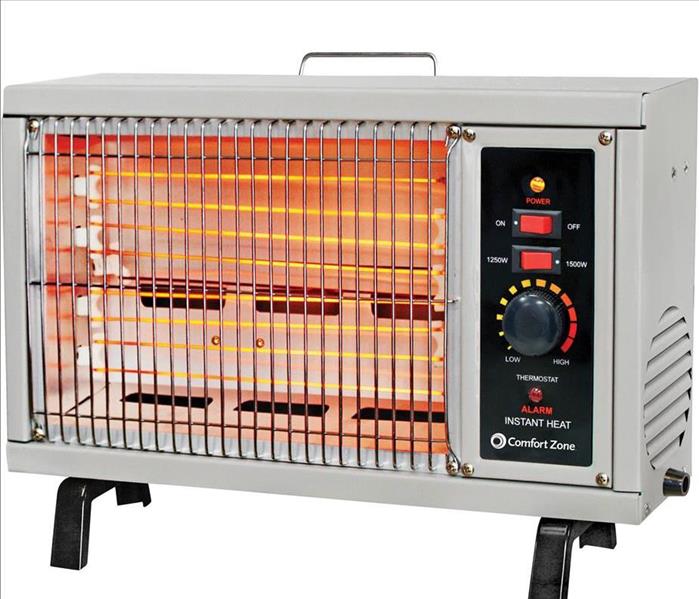 Staying warm is a must in the winter, but please stay safe.
Staying warm is a must in the winter, but please stay safe.
Alternative Heating Sources May Also Create a Fire Hazard.
- Avoid using an older space heater, as it may not have adequate safety features compared to newer units. When purchasing a new space heater, ensure it is UL Listed and pay attention to the safety features.
- Do not place a space heater near furniture, curtains or other objects that could easily catch fire.
- If you plan to install an alternative heating system, such as a wood or pellet stove, follow the manufacturer's instructions. If you are unsure about how to properly install the system, consider hiring a professional to do the installation.
- Before installing a wood or pellet stove, check to ensure it complies with the laws of your state and municipality.
Dirty Chimneys Also Pose a Fire Hazard.
- Have your chimney inspected annually by a Chimney Safety Institute of America (CSIA)-certified chimney sweep. Have a professional clean and repair the chimney as needed, especially before the cold months, when you will be using it frequently.
- Use seasoned wood only. Never burn green or damp wood.
- Never burn cardboard boxes, wrapping paper, trash or trees in your fireplace—these can all spark chimney fires.
Keep Fall Fire-Free
10/13/2017 (Permalink)
The fall season brings cooler temperatures, beautiful colors, and an abundance of outdoor activities. Plan ahead this season to help ensure it is safe and fire-free.
- Fall decoration, like dried flowers and cornstalks, are highly flammable. Keep these and other decorations away from open flames and heat sources, including light bulbs and heaters.
- Keep emergency exits clear of decorations so nothing blocks escape routes.
- Teach children to stay away from open flames. Be sure they know how to stop, drop, and roll if their clothing catches fire.
- Remember safety first when choosing a Halloween costume. Consider avoiding billowing fabric. If you are making your costume, choose material that won't easily ignite if it comes into contact with heat or a flame.
- It is safest to use a flashlight or battery-operated candle in a jack-o-lantern. Use extreme caution if using a real candle. Place lit pumpkins away from anything that can burn, and out of the way of doorsteps, walkways, and yards.
Facts and information provided by National Fire Protection Association, nfpa.org
Grilling Safety
6/22/2016 (Permalink)
July is just around the corner and happens to be the peak month for grilling fires, followed by May, June & August. Three out of five households own a gas grill, which translates to an increased risk of home fires. Nearly 9,000 home fires are started by grilling accidents each year.
The leading factor (19%) contributing to grill-related accidents is failure to clean the grill. The second leading factor (17%) is having a flammable item too close to the grill. So be sure to clean your grill properly before use and make sure that all flammable items are out of the way.
Placement of your grill is important, grills should be placed well away from home/deck railings and out from under eaves and branches. Also check for leaks or breaks in your gas lines before each use.
The National Fire Protection Association (NFPA) offers several additional grilling safety tips at http://www.nfpa.org/public-education/by-topic/outdoors-and-seasonal/grilling.
Please take the proper steps to avoid any grilling accidents this summer.





 24/7 Emergency Service
24/7 Emergency Service
